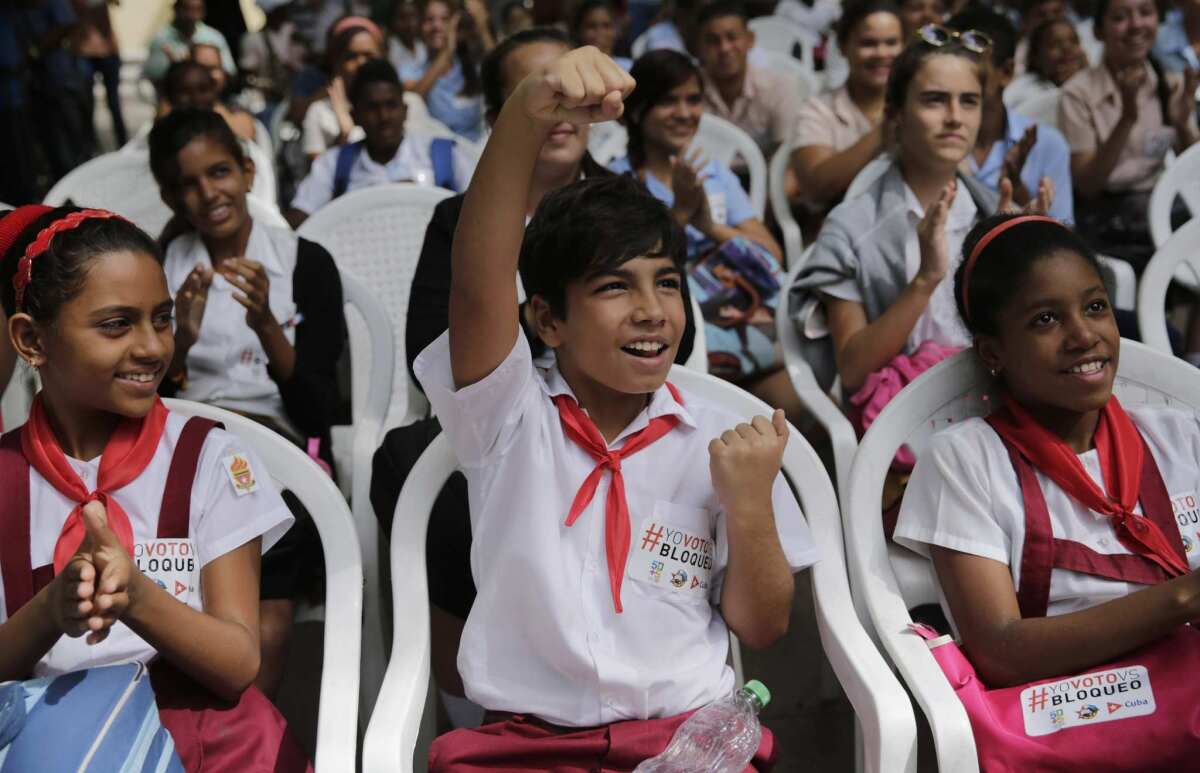For first time, U.S. abstains in U.N. vote to lift Cuba embargo
- Share via
Reporting from Washington — The United States abstained Wednesday for the first time from an annual vote at the United Nations calling for lifting the U.S. trade embargo against Cuba, a resolution Washington had always adamantly opposed.
The abstention was another step marking the end of more than 50 years of official U.S. hostility to Cuba. Washington’s annual vote against the resolution had seemed increasingly anachronistic and isolated to the White House.
The final vote was 191 votes in favor of the nonbinding resolution, with the U.S. and Israel abstaining.
U.S. Ambassador to the U.N. Samantha Power announced the abstention to the U.N. General Assembly ahead of the vote and received sustained applause, including from members of the Cuban delegation.
“The resolution voted on today is a perfect example of why the U.S. policy of isolation toward Cuba was not working – or worse, how it was actually undermining the very goals it set out to achieve,” Power said.
“Instead of isolating Cuba, as President Obama has repeatedly said, our policy isolated the United States, including right here at the United Nations,” she added.

Students cheer after hearing the United Nations vote result on the Cuba embargo resolution, in Havana, Cuba on Wednesday.
The U.S. abstention was not unexpected since Obama announced the reopening of diplomatic and economic ties with Cuba’s communist-led government in December 2014. In March, he became the first sitting U.S. president to visit the island nation since the 1920s.
The White House has repeatedly urged Congress to lift the embargo, most recently in a speech this month by the president’s national security adviser, Susan Rice. She called the embargo “an outdated burden on the Cuban people.”
But only Congress can take that step, and Republicans especially have resisted, arguing that Cuba should be made to offer more concessions, especially in the realm of human rights..
Obama has steadily eased restrictions on travel, commerce and other exchanges to widen the opening between the former enemies. He lifted regulations this month, for example, to allow American visitors to bring rum and cigars back from Cuba.
The two countries reopened their embassies last year. Cuba now has an ambassador in Washington while his potential American counterpart in Havana awaits Senate confirmation.
The U.N. resolution opposing the embargo has been up for a vote every year since 1991. It always was widely supported except by the U.S. and a handful of allies, and it served to inflame Cuba’s anger.
On Wednesday, Cuban Foreign Minister Bruno Rodriguez welcomed Washington’s reversal as “a promising signal.”
“We hope it will be reflected in reality,” Rodriguez said from the General Assembly floor.
Cuba’s President Raul Castro has slowly reciprocated some of Washington’s gestures, playing host to Obama’s visit and allowing limited ventures in private enterprise on the island. But progress in democracy, press freedoms and human rights remain elusive.
Power, speaking at the U.N., criticized Cuban security forces’ crackdowns on peaceful protest marches, detentions of dissidents and censorship of much outside information.
“We are profoundly concerned by the serious human rights violations that the Cuban government continues to commit with impunity against its own people,” she said.
But, ultimately, she said, the two countries “must continue to find ways to engage, even as our differences persist.”
The U.N. abstention, Power said, was a “small step,” adding, “May there be many, many more – including, we hope, finally ending the U.S. embargo once and for all.”
For more on international affairs, follow @TracyKWilkinson on Twitter
ALSO
Seeking justice — and millions — for families of people killed by police
Congress and State Department at odds over $55 million in aid for Honduras
Defense secretary orders Pentagon to stop collecting California National Guard bonus repayments
More to Read
Sign up for Essential California
The most important California stories and recommendations in your inbox every morning.
You may occasionally receive promotional content from the Los Angeles Times.











